- Home
- Steven Becker
The Wreck of the Ten Sail Page 2
The Wreck of the Ten Sail Read online
Page 2
I went to go below when I saw Rory coming onto the deck. Her words still stung and I turned towards the hold to hide. Too late. She called to me.
“A word, Nick?” Her voice rang sweeter than before.
I looked in her direction, and when I saw the moonlight on her face and her freshly brushed hair, I forgot her earlier words. I went towards her and she guided me to an empty spot near the stern.
“I’ll apologize for what I said earlier,” she said in the way that a woman says something to make peace, but doesn’t really mean it.
I was helpless around her. I nodded.
“I saw you with the chart. Where’re we headed?”
“South,” I said coyly.
She smacked my arm and waited.
“Cayman Islands. We need a beach to careen the boat and make some repairs.”
Rory turned to me. The look on her face was one I’d seen once before, but now I wondered what it meant.
CHAPTER THREE
We were into the afternoon of the next day when one of the men in the rigging spotted land. The island was just a faint line on the horizon, but the clouds holding above indicated it was indeed our destination. The problem now was time. Mason knew of the island, but had never been there himself, and the chart showed little detail save for a deadly ring of reefs surrounding the landmass. Approaching after dark would be too risky.
The men wouldn’t be happy about having to man the pumps overnight, but there was little else to do. I ordered the topsails furled and the mains reefed to slow our progress. I scrapped the night watch and called everyone on deck. Mason and I split the night and I added a rotation of men on the pumps.
This close to an unknown shore, extra precautions would be needed. I sent two men to the bow to work in shifts, one watching the other on the lead. Now at our posts, the silence was unnatural. Everyone was quiet, listening for the sound of surf breaking on the shoreline or a shoal. A sound any man on a ship dreaded, especially at night.
At dawn we heard the unmistakable sound of water hitting land and all hands came on deck to watch. The lead had still not struck bottom, but there, not a quarter mile away, was land. I left the wheel to Mason and climbed the rigging for a better vantage point from which to watch our approach. From near the top of the main mast, the water was the deepest blue I had ever seen, but the land was hellish. Jagged grey rocks extended into the water, offering no approach to the island. I yelled down to Mason to turn to starboard, hoping the western shore would be better protected from the trade winds and perhaps host a beach to careen the ship.
We crossed the entrance to a bay and I thought about seeking refuge there, but the clear water guarding its entrance told me it was shallow. Smoke rose in a column, suggesting there was a settlement there. Maybe we could go undetected, but the risk was not worth it. Past the bay I could see the land curl to the south and I relayed the information to Mason. The sails swung from a dead run to a beam reach as he changed course to follow the shoreline. I soon forgot the smoke, when, around the point, I saw the brilliant white sand stretching for miles.
As we approached the crescent-shaped beach, I climbed down and went to the bow. “Anything on the lead yet?” I asked Red.
“Not a thing,” he answered, and tossed the weight again.
We were close to shore now, closer than I would have liked without knowing the area. I scanned the deck for Blue. The pygmy had a sixth sense about these things. I found him in the rigging on the foremast.
“What do you think?” I called up to him.
“Is good,” he yelled back.
That was enough for me. Provided the bottom eventually showed itself, the spot was perfect. From the rigging, one could see the bay over the thin landmass. An attack would be easy to spot. Fresh water might be a problem, but we had several casks in the hold that would last several days, long enough to make the repairs we needed.
I heard the man on the line call out twenty fathoms and looked over the rail. The bottom was still invisible and we were within spitting distance of the beach. He called ten fathoms and the color changed drastically to a clear green. Rocks and coral became visible.
“Drop anchor,” I yelled.
The men in the rigging dropped sail, the chain slid through the cleats, and I waited for it to grab. Not ten feet from shore, the hook caught and swung us stern to the beach, the waves crashing right behind us. I lined up two palm trees in the distance and waited several minutes to see if we drifted. The ship held. I let out a sigh of relief.
Careening a boat in the best of circumstances was hard work. In northern latitudes one only had to beach the boat at high tide and wait for the water to recede, but this close to the equator the tides were only about a foot in difference. Everything would have to come off the ship and then we would undergo the strenuous process of hauling her masts. We could only hope they could take the stress and not break when we pulled them to the ground and rolled the hull onto its side. Fortunately there were some large palm trees within fifty feet of the shoreline we could use to anchor the ground tackle.
I posted a watch while Rhames quickly organized the men into groups and started the tedious process of unloading.
“Cannon first,” I called to him. She was a light ship with only four carronades—two on each rail. I marked the sand where I wanted them: one facing in each direction at forty-five-degree angles to the water so any approach by land would be covered. The other two were to be faced towards the sea at an angle that would have them hit any ship attempting to board us. Lucy and Blue came towards me, both carrying blowguns, and I nodded without a word. They would find food and water.
The cannon were unloaded and set in place with a keg of powder and shot beside them. The next chore was to offload the cargo. Using the boom, we rigged a block and pulley to ease the work of lifting the crates and chests from the hold. Everything was then set on the beach and inspected for water damage. The storm had ruined at least a third of the trade goods: cotton, fabric, and foodstuffs. Last to come off were the chests holding what remained of Gasparilla’s treasure. We had only half of what we had originally departed with, but even that filled two large chests and would ensure us all a life of leisure if we could ever get anywhere safe enough to spend it.
We had lost a good part of it in the mouth of the Charlotte River when one of the boats had gone down, and another two chests were buried on a small island in the Florida Keys, but the US Navy patrolled those waters and, to their eyes, we were pirates. So there it would remain, at least until we could clear our names and were welcome in American waters.
Rory came towards me as I directed the last crate to its resting place. “You’ve been ignoring me.”
I had been. It was her questions I was avoiding, her persistent prodding about the future.
“I don’t have the answers you’re looking for,” I said. When she moved to interrupt, I raised my hand. “First we fix the ship. Then we figure out our next step.” I was in no mood for another argument.
She sensed my fatigue and backed down. “Just tell me how to help,” she said.
“We need firewood.”
Without a word she walked toward the tree line. I heard footsteps approaching as I watched her go, and my gaze lingered on the jungle long after she disappeared. Why was everything with her so hard? Several seconds passed before I realized Rhames was standing next to me waiting for orders.
“Can I suggest we send a scout in both directions?” he asked. “Have ’em walk the beach until dark and then come back. That’ll give them about an hour, enough to cover a few miles before they turn around. Get a sense of what’s out there.”
“Right, then,” I said, glad for the interruption. “From the rigging I could see the bay is not a hundred yards through the trees. Maybe we ought to set a watch there to make sure no one comes at us from that direction.”
“Aye. I’ll handle it, then. I see you got your hands full with the girl.” He grinned and walked away.
There were on
ly three of us left on the beach now, and with darkness coming, I went after Rory to help with the firewood. As I approached the tree line, she came out with an armful and we walked in silence back to the beach. We made several trips between the jungle and the pile before she spoke.
“You know I’m not looking to fight all the time. I can help you if you just let me,” she said.
“I can’t get past tomorrow, never mind cast our future for you,” I said.
“I have some ideas,” she said. “Maybe we can talk later.” Then she turned and walked back towards the brush.
I moved to follow her when the sound of an animal slithering through the brush caught my attention, and I realized why we had seen no sign of man.
The caiman’s eyes glowed in the twilight as it stalked her. I took a few steps backward to look for a weapon and it turned its beady eyes on me. For every wary step backwards I took toward the safety of the beach, the caiman shuffled its four small legs and, with blinding speed, ate up the distance. We were only feet apart when it snapped its jaws and allowed me a glimpse of the rows of razor-sharp teeth. I stood silently gaping at it. For now it seemed content to hold the ground, but I doubted that would last. With only the dagger in my belt, I sought a diversion.
“Nick,” I heard Rory call. I had to keep her away.
The croc’s head turned toward her.
“Nick,” she called again.
It was confused now, the spell broken, and I did the only thing I could. I threw the firewood towards it, turned, and ran. I had to keep it from her. It came after me faster than I thought possible. I was in the clear of the beach and still it came, its jaws inches from my pumping legs. Just as I dove into the breakers, I heard the gunshot. When I glanced back, Swift was standing over the carcass, musket in hand and a grin on his face.
CHAPTER FOUR
After feasting on the caiman, we sat around the fire, watching it slowly burn down to embers. It was warm enough and we didn’t want our night vision ruined by flames. The scouts had walked the beach and found settlements in both directions. With men near and the caimans grunting at our backs, we would have to remain cautious. Lucy and Blue had gone farther than the scouts and reported that the thin landmass extended as it turned east. Tomorrow they would take the canoe and explore the bay.
I had just dozed off when I felt Rory next to me.
“Can we talk?”
The dreaded words shook me awake. “Sure,” I muttered, and sat up.
“Don’t take this too hard. I’m a woman and we think differently. You lot could sleep in the sand and drink rum every night, but I want more from this life.”
She had my attention now. I too had been brought up in better circumstances than I found myself in now. I had enjoyed the company of Gasparilla, who was also educated, but I was not a pirate at heart. Besides Mason, the present crew left me wanting. “I have to admit the same,” I said.
“You know the problem, then.”
I did. “Pirate stench is hard to wash off,” I said.
I could see her almost smile in the soft light of the fire. “So we agree.”
“Knowing it and knowing what to do about it are two different things. I was brought up with books and numbers, not cutlasses and muskets.”
“Then walk away,” she urged. “I know the governor here. If it’s the same man, maybe he can help.”
That was it, then. I remembered the strange look on her face when I’d told her our destination a few days before. Now I sat in silence next to her, wondering what she was after.
***
With the task before us and the lack of rum the night before, we were up at dawn. While the men restarted the fire and ate, Blue and I scouted the brush, collecting branches from the trees. We brought these to a pit that Lucy had dug and lined with dried palm fronds. Inside the pit was a large vessel jammed with sticks and covered with sand. Once the fire started we piled wood on top and left the oven to burn.
The sails were hauled down and laid out on the beach, where Lucy and Rory inspected them for damage, repairing anything that looked suspect. Next the yards were removed and the masts stripped of their rigging. Mason and I hauled the blocks and tackle out to the trees and started rigging them there. A double loop around the base of the stoutest palm provided the support we would need to roll the hull. The rope was run through the tackle, and the men gathered around, ready to pull.
Together we pulled the mast down close to the sand, rolling the ship and exposing the seaward side of the hull. The lines were tied off and we got to work. We were already exhausted from the effort, but we were anxious to get the ship righted as soon as possible. Swift, Red, and Mason rigged scaffolding on the seaward side, allowing us to work out of the water. First, any broken planks were removed and replaced. When this was finished we split into pairs and tended to every board. One man would pry the planks apart while the other stuffed the gap with cotton. When the boards were released, they compressed the cotton, sealing the gap. It took the better part of the morning to seal one side of the hull. We paid special attention to the keel, which had taken the brunt of the damage.
After a break for lunch, we uncovered the pit, cool since the fire had burned out, and took the container it held, now full of pitch, to the ship. There was not enough to coat the entire hull, so we carefully applied the tar to each crack and joint to seal them. By midafternoon the work was done and we relaxed. Tomorrow we would repeat the process on the other side.
I tried to rest, but anxiety ate at me. In another day the Panther would again be seaworthy and her crew in need of purpose. In the old days we would just sail off in search of another victim, but I had driven home to the men that their days of plunder and debauchery were over. There were few ports that accepted our kind now, with Port Royal and some other famous haunts being closed by the Crown. The last places still open to pirates were no place we wanted to be. With a crew of eight men and two women, we would be easy prey for the larger bands.
My thoughts were interrupted by a call from the watch, and I saw Red pointing at two ships anchoring just off shore. With men at the seaward cannons, we armed and gathered in a semicircle ready to face the threat.
One of the ships dropped a small dory into the water. Four men climbed in the boat and started rowing for the beach, but they were not my concern. I was studying the schooners holding offshore. They flew the Union Jack, and I wasn’t sure if I should be comforted or alarmed. Whatever their intentions, we had no escape. With the careened hull of our ship, four cannon and only a handful of men, we would need to play this very carefully.
“Ahoy,” I called towards the men in the dory. One man jumped from the bow and, with the aid of a small wave, pulled the boat onto the beach. The other men jumped out. Although they had cutlasses at their sides, they were not drawn. A well-dressed, older man was last to reach the beach.
“Who’s in charge of this lot?” he asked as he came forward.
I stepped forward. “I am.” I extended my hand.
He looked at me suspiciously. “This your boat?”
“Aye. We got caught in a storm and she started taking on water,” I explained.
“Governor will be wanting to see you.” He pointed to the south. “There’s a small settlement called Georgetown at the end of the beach. Follow that round and you’ll come to Bodden Town. It’d be a bit easier across the bay, though.”
Mason and Rhames were by my side now.
“What’s to stop us from making repairs and leaving?” I asked.
He set a hand on his cutlass, causing us to do the same, then released it. “Seems you have a bit of work to do there,” he said, nodding at our ship.
I acknowledged the threat. We were indeed sitting ducks until the boat was repaired—easy cannon fodder for the two schooners offshore. With only four cannon and a skeleton crew, we could not compete with their guns. Time was our enemy, but if I could stall him until Blue was able to scout out this Bodden Town, we would know what we faced.
&
nbsp; “Very well, tell your governor that I’ll be seeing him in a day or so.”
“Now was what he was thinking,” he replied. “We’d be happy to escort you—and the girl, too.” He cast a look at Rory.
This was no invitation. The two men in the boat pushed past Rhames and went for Rory. Swift and Mason closed ranks to protect her and I saw Rhames reach behind his back and pull a flintlock pistol. The old pirate was never far from weapons. He leveled the gun in their direction and they backed away.
“We’ll be needing no escort. If your governor wants to talk, have him come to us,” I said and signaled Swift to grab the man. In one move he had his dagger at the man’s throat. “You men,” I called to the others. “Go back to your ships and tell your governor that if he wants to talk to me, he can find me here.”
They looked at each other and then at their leader. Swift edged the knife closer.
“Go, you fools. Tell him there’s pirates on this beach,” he gasped.
Two men jumped in the boat and manned the oars while the other pushed off the beach. I watched until they were clear of the surf and pulling hard for the closest schooner.
“Take his weapons and tie him up.”
One of the schooners made a move towards the dory and I thought about our next step. I met eyes with Rory, regretting that once again we were on the wrong side of the law. With the prisoner still standing, Rhames tied his hands.
“Make him comfortable,” I said. I didn’t want any more ill will than I had already created. I walked over to Blue, and together we walked inland, past the tree line to the sparkling bay. After I called to them, Red and Swift followed with the canoe.

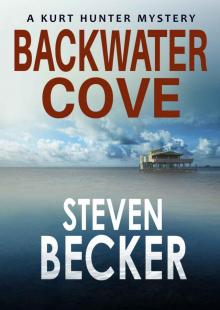 Backwater Cove
Backwater Cove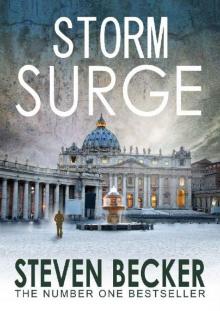 Storm Surge: A Fast Paced International Adventure Thriller (Storm Thriller Series Book 3)
Storm Surge: A Fast Paced International Adventure Thriller (Storm Thriller Series Book 3)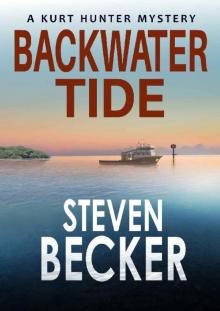 Backwater Tide
Backwater Tide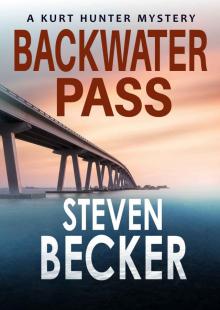 Backwater Pass
Backwater Pass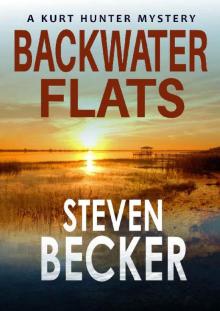 Backwater Flats
Backwater Flats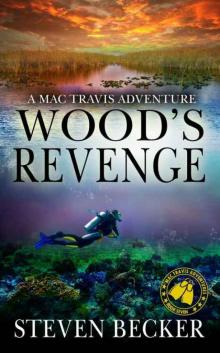 Wood's Revenge
Wood's Revenge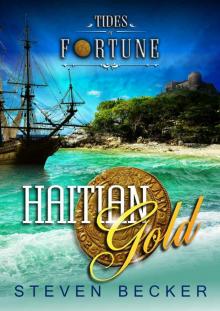 Haitian Gold
Haitian Gold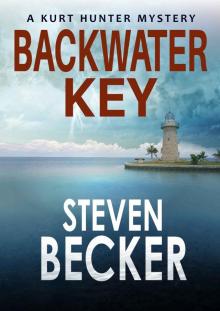 Backwater Key
Backwater Key Wood's Tempest
Wood's Tempest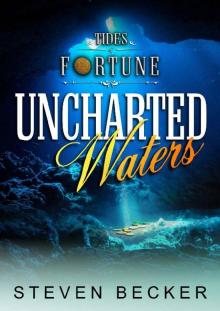 Uncharted Waters
Uncharted Waters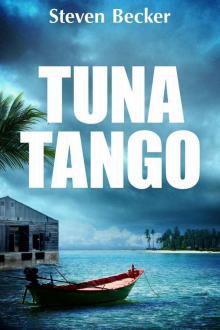 Tuna Tango
Tuna Tango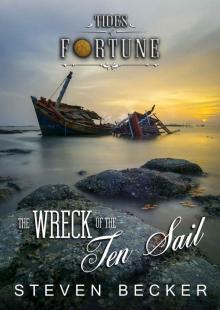 The Wreck of the Ten Sail
The Wreck of the Ten Sail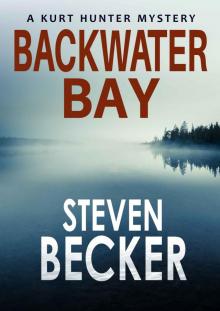 Backwater Bay (Kurt Hunter Mysteries Book 1)
Backwater Bay (Kurt Hunter Mysteries Book 1) Storm Clouds
Storm Clouds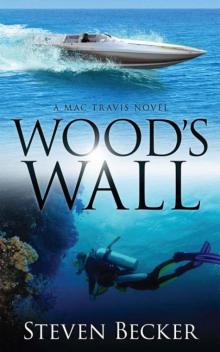 Wood's Wall
Wood's Wall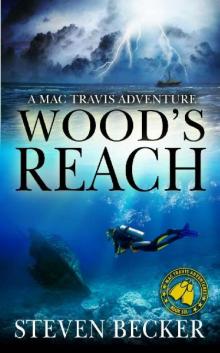 Wood's Reach
Wood's Reach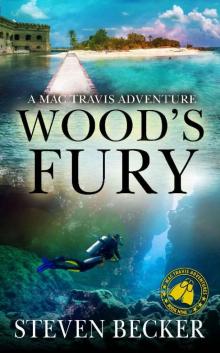 Wood's Fury
Wood's Fury Storm Rising
Storm Rising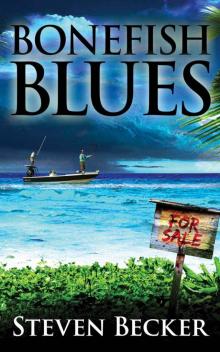 Bonefish Blues
Bonefish Blues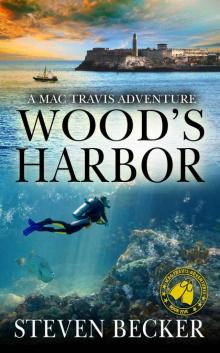 Wood's Harbor: Action & Sea Adventure in the Florida Keys (Mac Travis Adventures Book 5)
Wood's Harbor: Action & Sea Adventure in the Florida Keys (Mac Travis Adventures Book 5)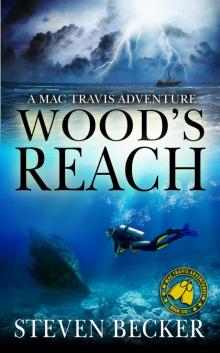 Wood's Reach: Action & Sea Adventure in the Florida Keys (Mac Travis Adventures Book 6)
Wood's Reach: Action & Sea Adventure in the Florida Keys (Mac Travis Adventures Book 6)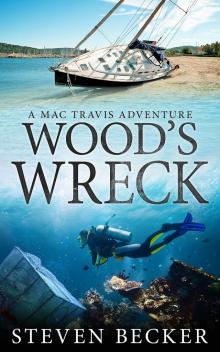 Wood's Wreck
Wood's Wreck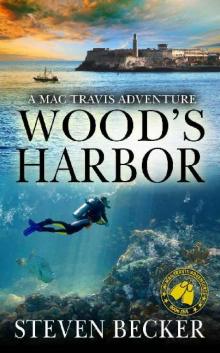 Wood's Harbor
Wood's Harbor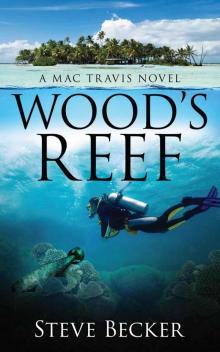 Wood's Reef
Wood's Reef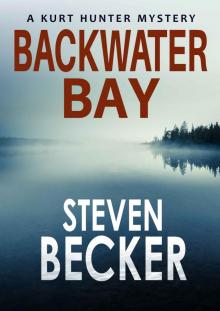 Backwater Bay
Backwater Bay